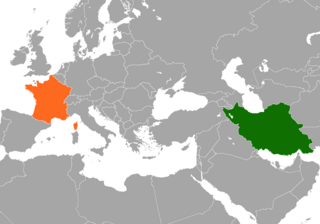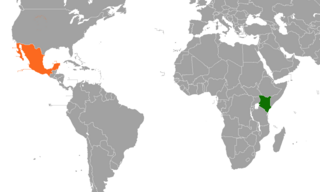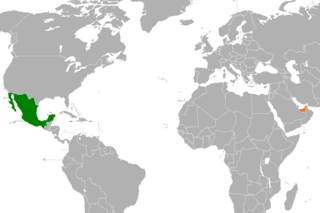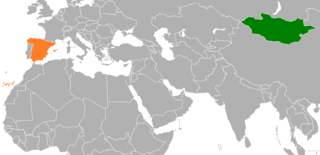
Cuba's foreign policy has been fluid throughout history depending on world events and other variables, including relations with the United States. Without massive Soviet subsidies and its primary trading partner, Cuba became increasingly isolated in the late 1980s and early 1990s after the fall of the USSR and the end of the Cold War, but Cuba opened up more with the rest of the world again starting in the late 1990s when they have since entered bilateral co-operation with several South American countries, most notably Venezuela and Bolivia beginning in the late 1990s, especially after the Venezuela election of Hugo Chávez in 1999, who became a staunch ally of Castro's Cuba. The United States used to stick to a policy of isolating Cuba until December 2014, when Barack Obama announced a new policy of diplomatic and economic engagement. The European Union accuses Cuba of "continuing flagrant violation of human rights and fundamental freedoms". Cuba has developed a growing relationship with the People's Republic of China and Russia. In all, Cuba continues to have formal relations with 160 nations, and provided civilian assistance workers – principally medical – in more than 20 nations. More than one million exiles have escaped to foreign countries. Cuba's present foreign minister is Bruno Rodríguez Parrilla.
Since 1980, the foreign relations of Iraq were influenced by a number of controversial decisions by the Saddam Hussein administration. Hussein had good relations with the Soviet Union and a number of western countries such as France and Germany, who provided him with advanced weapons systems. He also developed a tenuous relation with the United States, who supported him during the Iran–Iraq War. However, the Invasion of Kuwait that triggered the Gulf War brutally changed Iraq's relations with the Arab World and the West. Egypt, Saudi Arabia, Syria and others were among the countries that supported Kuwait in the UN coalition. After the Hussein administration was toppled by the 2003 invasion of Iraq, the governments that succeeded it have now tried to establish relations with various nations.

French–Iranian relations are the international relations between France and Iran. Iran has generally enjoyed a friendly relationship with France since the Middle Ages. The travels of Jean-Baptiste Tavernier are particularly well known to Safavid Persia. France has an embassy in Tehran and Iran has an embassy in Paris.

Diplomatic relations between Iraq and the United States began when the U.S. first recognized Iraq on January 9, 1930, with the signing of the Anglo-American-Iraqi Convention in London by Charles G. Dawes, U.S. Ambassador to the United Kingdom. Today, the United States and Iraq both consider themselves as strategic partners, given the American political and military involvement after the invasion of Iraq and their mutual, deep-rooted relationship that followed. The United States provides the Iraqi security forces millions of dollars of military aid and training annually as well as uses its military bases.

Cuba–Pakistan relations refers to the bilateral relationship of Cuba and Pakistan. Relations between the countries strengthened after Cuba provided humanitarian assistance to the victims of the 2005 Kashmir earthquake. Both the nations continue to strengthen the bilateral relations especially in the fields of higher education, agriculture, industry and science and technology and have also held talks for military cooperation.

Iraq–Saudi relations are the relations between the Republic of Iraq and the Kingdom of Saudi Arabia. Under Saddam Hussein, relations were manageable, especially after the Iran–Iraq War began in 1980. These manageable relations were soon quelled at the Gulf War, when Saddam's Iraq invaded Kuwait, leading to international sanctions on Iraq and a significant deterioration in Iraqi–Saudi relations. In 1990, the land borders between the two countries closed due to the Iraqi invasion of Kuwait. Nearly three decades later, Saudi Arabia and Iraq decided to open their border in October 2019 to boost trade relations.

Greek–Iraqi relations are foreign relations between Greece and Iraq. Relations of the Greek and Iraqi peoples are deeply rooted in history, both have developed cultures that have influenced the course of humanity. They date as far back as when early Greek scholars of the 1st millennium BC lived and studied in Babylonia and Assyria, to later when Alexander III of Macedon ruled Mesopotamia and would die in Babylon, Iraq. Greece firmly and consistently supports the independence, sovereignty and territorial integrity of Iraq. Greece traditionally maintained good and friendly relations with Iraq due to strong historical and cultural bonds, dating back to ancient times.
Cuban-Pacific relations are diplomatic, economic, cultural and other relations between the Republic of Cuba and countries situated in Oceania. In the 2000s, Cuba has been strengthening its relations with Pacific nations, which have, for the most part, responded favourably to Cuban medical aid in particular. The first Cuba-Pacific Islands ministerial meeting was held in September 2008 in Havana, with government members from ten Pacific countries—Kiribati, Tuvalu, Nauru, Solomon Islands, Fiji, Tonga, Vanuatu, Samoa, the Federated States of Micronesia and Papua New Guinea—attending. The meeting was a consolidation rather than a starting point of Cuban-Pacific relations.

Iraqi–Serbian relations are foreign relations between Iraq and Serbia. Iraq has an embassy in Belgrade, and Serbia has an embassy in Baghdad.

Iraqi-Lebanese relations have been close throughout history, both politically and culturally. Iraq and Lebanon have maintained diplomatic relations since 1943. Both countries have refused to recognize Israel and have recognized the State of Palestine.

Colombia–Malaysia relations refers to bilateral foreign relations between Colombia and Malaysia. Colombia maintains an embassy in Kuala Lumpur, while the embassy of Malaysia in Lima, Peru is accredited to Colombia.

Cuba and Indonesia established diplomatic relations in 1960. During the administration of Indonesia's first president Sukarno in the 1960s, Indonesia and Cuba enjoyed an exceptionally close relationship. The relations between the two nations mostly focused on sports and health. Cuba has an embassy in Jakarta, while Indonesia has an embassy in Havana that is also accredited to the Commonwealth of the Bahamas and Jamaica. Both nations are full members of the Non-Aligned Movement and partners in the Group of 77 and the Forum of East Asia-Latin America Cooperation.

Cuba–Mexico relations are the diplomatic and bilateral relations between the Republic of Cuba and the United Mexican States. Both nations are members of the Association of Caribbean States, Community of Latin American and Caribbean States, Latin American Integration Association, Organization of American States, Organization of Ibero-American States and the United Nations.

Kenya–Mexico relations refers to the diplomatic relations between the Republic of Kenya and the United Mexican States. Both nations are members of the Group of 15, Group of 24 and the United Nations.

Mexico–United Arab Emirates relations refers to the diplomatic relations between Mexico and the United Arab Emirates. Both nations are members of the United Nations.

Belarus—Iraq relations refers to the bilateral relations of the Republic of Belarus and the Republic of Iraq. Belarus does not have an embassy in Baghdad, but it does maintain a consulate in Erbil. Iraq has an embassy in Minsk. The last Ambassador of Iraq to Belarus was Haidar Hadi who served from July 2010 to November 2015. Since his post expired, there has been no Iraqi Ambassador in Belarus. Both are members of the Non-Aligned Movement.

Iraq–Sri Lanka relations describe diplomatic and other relations between the nations of Iraq and Sri Lanka. The countries were historically close under the Iraqi Ba'athist regime. Iraq was the largest buyer of Sri Lankan tea during the reign of Saddam Hussein. Ties between Sri Lanka and Iraq were disrupted during the Iraq War. However, in 2018 Iraq re-emerged as the largest buyer of Sri Lankan Tea. Sri Lanka has an embassy in Baghdad and Iraq has an embassy in Colombo.

Mongolia–Spain relations are the bilateral and diplomatic relations between these two countries. Mongolia does not have embassy in Spain, but his embassy in Paris is accredited to this country, he also has an honorary consulate in Barcelona. Spain does not have an embassy in Mongolia, but its embassy in Beijing is accredited to this country.

The bilateral relationship between Jordan and Kuwait is considered to be strong, though there are still sporadic tensions. Jordan hosts an embassy in Kuwait City, and Kuwait hosts an embassy in Amman.

Iraq–Vietnam relations refers to the bilateral, economic and political relations between Iraq and Vietnam.




















